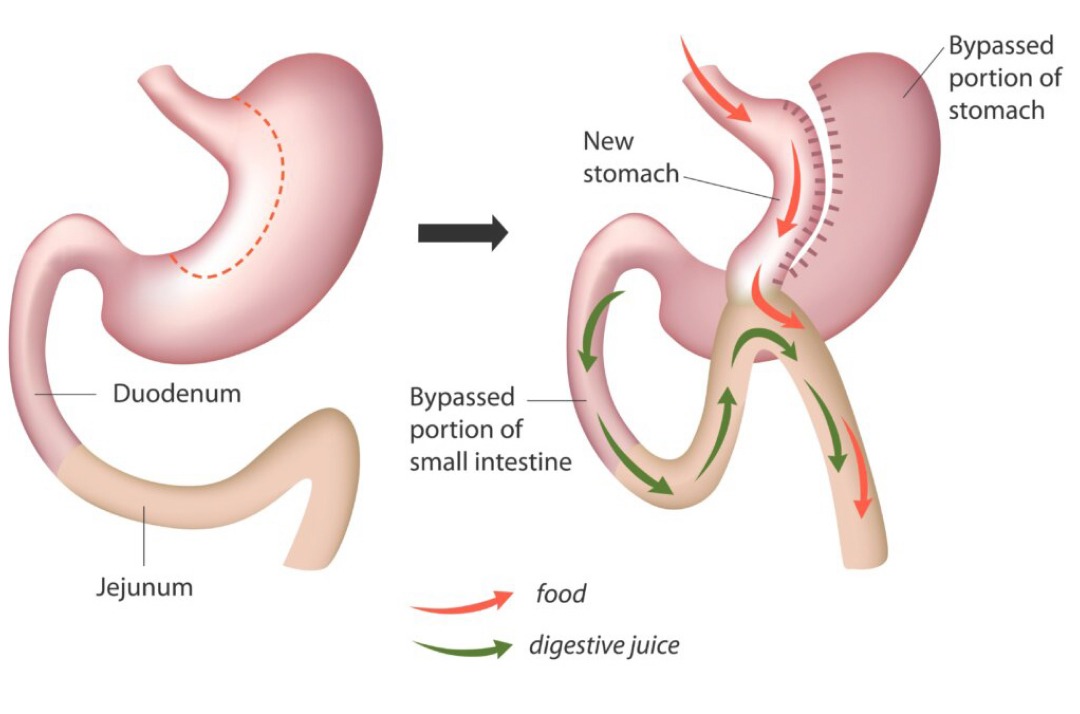CQC Registered Provider
Mini Gastric Bypass
Private Gastric Bypass Surgery in the UK
Mini Gastric Bypass with Allure Weightloss
Sustainable Weight Loss
Within the first two years after your operation, the average weight loss is up to 70% of excess weight.
Improve Health Conditions
You can expect improvements in any weight-related conditions that you might have, such as type 2 diabetes, heart disease, osteoarthritis, obstructive sleep apnoea, high blood pressure, and polycystic ovaries. Speak to our team to learn more.
Increased Mobility
Patients find they are able to do more physical activity, which, when paired with lifestyle and diet changes, can lead to an increase in energy, fitness, strength, stamina, bone density, and more.
Hours
Length of Surgery
The gastric sleeve procedure, also known as the sleeve gastrectomy, takes between 1 to 4 hours to perform.
Day
Length of Stay
Patients usually only need one night in the hospital before continuing their gastric sleeve recovery at home. In some circumstances this may extend to two or three.
Weeks
Time Off
Depending on what you do for work, 1 – 2 weeks off is usually required. Full recovery will take place between 6 and 8 weeks.
What is the Mini Gastric Bypass?
The mini gastric bypass offers similar weight loss to the roux-en-y gastric bypass but is the faster and simpler of the two bariatric procedures. Due to how the mini gastric bypass procedure is performed, the risk of an internal hernia doesn’t apply.
Now firmly established as a treatment offered by the NHS, the mini gastric bypass offers several benefits over the traditional gastric bypass surgery. For example, weight loss outcomes are marginally better, the bowel is not cut through and reattached, there is only one join between stomach and bowel. Less incisions made means less risk and faster recovery overall. This makes the difference between the roux-en-y gastric bypass and mini gastric bypass quite pronounced and worth considering.
Mini Gastric Bypass Surgery
You Can Expect
Up to 80%
Excess Weight Loss
Up to 4 hrs
Surgery Time
1-2 Nights
In Clinic
6-8 Weeks
Recovery Time
2-3 Weeks
Time off Work
Am I suitable?
Find out now
How Does the Mini Gastric Bypass Work?
Much like the roux-en-y gastric bypass, the mini gastric bypass procedure works by restricting the intake of food into the stomach. It drastically reduces the size of the available stomach, without removing anything unlike the gastric sleeve. The mini bypass relies on a series of alterations to the stomach that can be better attributed to ‘plumbing.’
As well as restricting the physical size of your stomach the psychological size of your appetite will also be impacted due to the reduction in the hunger hormone (ghrelin) produced as a result of the surgery.
The Mini Gastric Bypass was developed by Dr Robert Rutledge in 1997.

What Can Mini Gastric Bypass Patients Expect?
Who will be Involved?
Pre Op
You’ll be assessed to check that you’re fit for the operation. This may include blood tests, x-rays, and scans, as well as an explanation of the surgery and long-term outlook. You may need to lose weight and reduce the size of your liver. If your liver is smaller, the operation will be easier and safer.
You shouldn’t eat for several hours before your gastric bypass, but you can continue to drink clear liquids until two hours before. Should you need to stop any medication in preparation for your bypass surgery, your doctor will tell you. You’ll also have plenty of time to ask any questions and discuss your concerns before your surgery.
Associated Risks
As with any surgeries, there are risks involved in the gastric bypass procedure. These include excessive bleeding, infection, and blood clots among others. During your initial consultation, the Bariatric Consultant will be able to talk through these risks with you and answer any questions you may have.
Mini Gastric Bypass Aftercare
We offer a comprehensive aftercare package with all surgical and non-surgical medical weight loss procedures. Our HCPC registered dieticians will help you create a new diet and exercise routine to keep you on top of your weight loss journey. We also offer one-to-one support from our team of nurses, both before and after your weight loss treatment.

Mini Gastric Bypass Clinics
Our mini gastric bypass clinics were selected for the existing high-standards of said facilities and the ability to meet the standard of patient care demands that we would expect. You can learn more about our gastric bypass clinics by clicking on the images below.
A Consultant may Recommend the Mini Gastric Bypass If:
- You have a BMI of at least 35.
- You’ve already attempted to lose weight via traditional methods such as dieting and lifestyle changes.
- You’re willing to have long-term follow-up appointments.
- You are willing to adopt a healthy diet and lifestyle.
- You’re medically fit for surgery and anaesthesia.
The Consultant may recommend gastric sleeve surgery first.
Mini gastric bypass surgery is not recommended for children and young people.
You may be required to pass a psychological assessment first.
Potential alternatives to the mini gastric bypass surgery include:
Calculate Your BMI
In order to have a mini gastric bypass you need a BMI of at least 35. If you have a BMI of 35 you may be eligible, depending on whether you have any co-existing medical conditions or concerns. You can use our Calculator in order to determine your BMI, or use the NHS BMI Calculator.
How is body mass index (BMI) measured?
An individuals BMI is calculated by using the following formula:
BMI = Weight (kg) / Height (m)²
You must take your weight in kilograms, divide it by your height in meters, and then divide it a second time by your height in order to determine the correct body mass index.
Not sure you qualify?
If you still aren’t sure, a member of our team will be able to help. If you are certain you won’t qualify for gastric bypass surgery, you still may be eligible for other medical weight loss treatments.
BMI Calculator
Use this Calculator to Check Your Body Mass Index (BMI).
Please enter a value between 125 and 225.
Please enter a value between 10.0 and 500.0 ( one decimal )

Ask About Gastric Bypass Consultations, Cost, and More
Start the process and book your private mini gastric bypass consultation today with Allure Weightloss. Simply speak to a member of our team to discuss the procedure and pathway in more depth. Allure Weightloss is a CQC registered provider of bariatric surgery in England and Wales.
Frequently Asked Questions
Most patients can expect to lose up to 70% of their excess weight in the two years after their surgery.
Dumping syndrome is a collection of uncomfortable symptoms, such as feeling sick, weak, faint, sweaty and diarrhoea, caused when sugary foods move from your stomach into the small intestine too quickly.
Avoid drinking and eating at the same time to help prevent dumping syndrome.
After surgery, you’ll not be able to eat until your X-ray and swallow test. At first, you’ll have to eat a soft diet and your dietitian will give you a diet plan for the weeks after surgery.
Surgery can be used to remove this excess skin, although under normal circumstances this is considered to be a cosmetic procedure.
Must have a body mass index (BMI) of 35.
You must have also tried to lose weight through diet and lifestyle, and be willing to have long-term follow-up appointments and adopt a healthy diet and lifestyle. You’ll also need to be medically fit for surgery and anaesthetic.
Gastric bypass surgery is a common procedure and most people have it without complications, but all surgery carries some risks. Your consultant will discuss potential risks and complications with you before the operation.
Yes. The surgery won’t stop you craving or eating unhealthy food. You must be willing to make long-term lifestyle changes in order to avoid putting weight back on.
Depending on how strenuous your work is, you may need to recover for two to four weeks before returning to your job.
Gastric bypass surgery is generally non-reversible. There is a risk of you reversing your weight loss if you do not follow the advice provided.
It’s not recommended that you drink alcohol for the first six months. You will feel the effects of the alcohol faster than before. This is because you will absorb it differently.
It’s okay to drink caffeine after your gastric bypass surgery, but you should avoid drinking too much as it acts as a diuretic and can cause dehydration.
You should avoid taking a class of medication known as non-steroidal anti-inflammatory drugs (NSAIDs) as these can irritate your stomach and cause stomach ulcers. Common drugs in this category include aspirin, ibuprofen, and naproxen.
You should try to stay hydrated throughout the day after your gastric bypass surgery. Your dietitian will advise you on what you should be drinking in detail. Please avoid fizzy and sugary drinks.
As you start to lose weight after your bypass surgery, your body will need more protein to maintain your muscle mass and have a healthy metabolism. If you don’t get enough, your body will start to rely on the protein from your muscles. This will cause them to weaken.
Yes. After your surgery, your stomach may start to digest things differently, including the iron in your foods. You may need to take iron supplements during your recovery to prevent any deficiencies, your doctor will advise you.
Case Studies
Take a look at some of our incredible weightloss success stories

Federica’s Gastric Balloon Journey
Federica lost a fantastic 9.4kg, a total of 12.8% of her starting body weight. Federica was able to use the gastric balloon tool as a way to kickstart a journey that she seeks to maintain with the knowledge she has gained from working with the Allure Dietitian.

Gillian Lost 20.31% of Her Weight with a Gastric Balloon
One of the first questions our team is asked is…

Costas Gastric Balloon Journey
Costas struggled to lose stubborn weight for the last few…

Jennifer Lost 18kg with a Gastric Balloon!
Jennifer, from Chelmsford, lost 18kg with a gastric balloon procedure…






